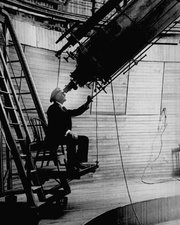Percival Lowell
|
|
Percival Lowell (March 13, 1855 – November 13, 1916) was a wealthy amateur astronomer who was convinced that there were canals on Mars, and was the founder of Lowell Observatory in Flagstaff, Arizona.
Biography
Percival Lowell came from the distinguished Boston Lowell family. In addition to his own accomplishments, his younger brother Abbott was president of Harvard University, and his sister Amy Lowell was a well-known Imagist poet and critic.
Percival Lowell graduated from Harvard University in 1876 with distinction in mathematics, and traveled extensively through the Far East before deciding to study Mars and astronomy as a full-time career. He was particularly interested in the supposed canals of Mars, as drawn by Giovanni Schiaparelli, who was director of the Milan Observatory and an esteemed Italian astronomer.
In 1894 he moved to Flagstaff, Arizona. At an altitude of over 7000 feet, and with few cloudy nights, it was an excellent site for astronomical observations. For the next fifteen years he studied Mars extensively, and drew intricate drawing of the surface markings as he perceived them. Lowell published his views in three books: Mars (1895), Mars and Its Canals (1906), and Mars As the Abode of Life (1908). He thereby instigated the long-held belief that Mars had once sustained intelligent life forms.
His works include a detailed description of what he termed the 'non-natural features' of the planet's surface, including especially a full account of the 'canals,' single and double; the 'oases,' as he termed the dark spots at their intersections; and the varying visibility of both, depending partly on the Martian seasons. He upheld the theory of the canals having been constructed for the purpose of 'husbanding' Mars's scanty water-supply.
Lowell's greatest contribution to planetary studies came during the last 8 years of his life, which he devoted to the search for Planet X, which was the designation for a planet beyond Neptune. The search continued for a number of years after his death at Flagstaff in 1916; the new planet, named Pluto, was discovered by Clyde Tombaugh in 1930. The symbol for the planet is a stylized "PL" (♇), chosen in part to honor Lowell.
It is interesting to note, that predictions of a planet beyond Neptune were based on discrepancies between the predicted and observed positions of Neptune and Uranus, and the erroneous assumption that such discrepancies were caused by the gravitational influence of an unknown planet. In fact, the discrepancies were due to erroneous values for the masses of Neptune and Uranus; with modern precise values, the discrepancies disappear, and in any case it is now known that the mass of Pluto is far too small to exert any appreciable gravitational influence on other planets.
External links
- Project Gutenberg e-texts of works by Percival Lowell (http://onlinebooks.library.upenn.edu/webbin/gutbook/author?name=Lowell,%20Percival)
- Lowell Observatory (http://www.lowell.edu/)
de:Percival Lowell
Asteroids discovered: 1 793 Arizona April 9 1907
es:Percival Lowell fr:Percival Lowell he:פרסיוול לוול ja:パーシヴァル・ローウェル nl:Percival Lowell pt:Percival Lowell sl:Percival Lowell sv:Percival Lowell th:เปอร์ซิวัล โลเวลล์ uk:Ловелл Персіваль zh:帕西瓦尔·罗威尔

